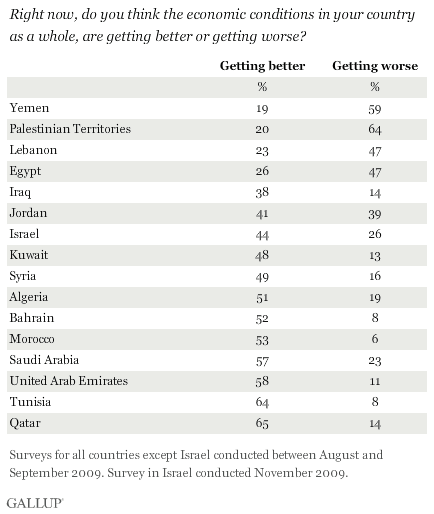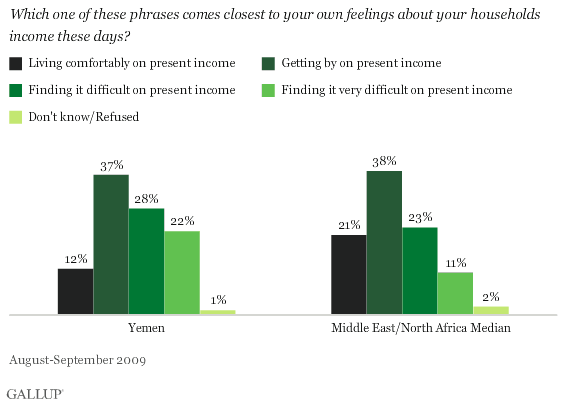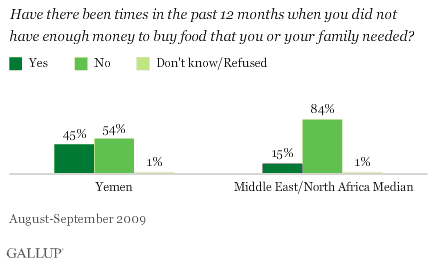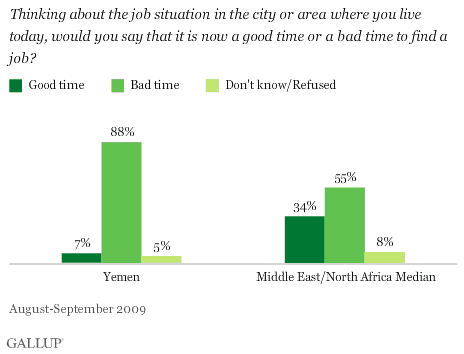WASHINGTON, D.C. -- Foreign ministers meet Wednesday in London to discuss international support for Yemen's economic development and security. Gallup surveys show the economic situation in Yemen is one of the most dismal in the Middle East and North Africa and many Yemenis expect it to get worse. Only Palestinians (64%) are more likely than Yemenis (59%) to say economic conditions in their country are getting worse.

Yemenis, more than 40% of whom reportedly live on less than $2 a day, are among the most likely in the region to report struggling to make ends meet. At the time of Gallup's survey in early August and September, half of Yemenis said they were finding it difficult (28%) or very difficult (22%) to get by on their present household incomes. Across the rest of the Middle East and North Africa, only Palestinians are more likely to report as much difficulty in getting by, with 23% saying they are finding it difficult and 40% finding it very difficult.

According to the United Nations' World Food Program, roughly half (48%) of Yemeni households are estimated to be food insecure, similar to the 45% who tell Gallup they were unable to afford food for their families at times in the past year. The percentage of Yemenis reporting an inability to buy food is three times higher than the median percentage for the Middle East/North Africa region (15%).

Between 2007 and 2009, the number of Yemenis who reported struggling to afford food surged at least 15 percentage points, from 30% in 2007 to 45% in the fall 2009 survey -- likely reflecting the global rise in food prices. Food prices have abated since last year, but they remain higher than before the crisis, making food unaffordable for many poor families.
Yemenis Grim About Job Climate, Creation
The jobs outlook in Yemen, where unemployment is estimated to be 35% or higher, is the bleakest in the region. At the time of the survey, 7% of Yemenis said it was a good time to find a job in their communities, with Palestinians the next lowest at 10%. Yemenis' dour estimation of the jobs situation prevails regardless of whether they live in urban or rural areas, or their age, education, and gender. Yemeni youth, who make up a larger percentage of the unemployed, are no grimmer about the situation than older Yemenis.

Given that they are universally pessimistic about the jobs situation, it is not surprising that relatively few Yemenis are satisfied with efforts to increase the number of quality jobs. Fewer than one in five Yemenis (19%) say they are satisfied with these efforts, similar to sentiment among Egyptians (22%), Palestinians (20%), and Iraqis (19%). Only the Lebanese are less likely to be satisfied, with 11% saying this.
Bottom Line
Yemen's Foreign Minister Abubakr al-Qirbi, who visited the United States last week, said that "a security or military solution alone is not sufficient" to tackle the threat of terrorism and is calling on the international community to pay more attention to his country's economic and development needs. Western and Gulf donors for the most part have responded positively to this call, but as U.S. Secretary of State Hillary Clinton said last week, they expect to see results on the ground if, and when, they provide development aid. Gallup's surveys show conditions on that ground are currently among the most dismal in the region, and there is much room for improvement.
Sign up for Gallup e-mail alerts or RSS feeds
Get Gallup news on Facebook and Twitter
For complete data sets or custom research from the more than 150 countries Gallup continually surveys, please contact worldpollpartners@gallup.com or call 202.715.3030.
Survey Methods
Results are based on face-to-face with approximately 1,000 adults, aged 15 and older, in Yemen, Saudi Arabia, Algeria, Egypt, Bahrain, Iraq, Lebanon, Jordan, Israel, the Palestinian Territories, Kuwait, and Tunisia. All surveys were conducted between August and November 2009. For results based on the total samples of national adults, one can say with 95% confidence that the maximum margin of sampling error ranges from ±3.4 percentage points in Bahrain to ±3.7 in the Palestinian Territories. For results based on the total sample of Yemeni adults, one can say with 95% confidence that the maximum margin of sampling error is ±3.7 percentage points. The margin of error reflects the influence of data weighting. In addition to sampling error, question wording and practical difficulties in conducting surveys can introduce error or bias into the findings of public opinion polls.
